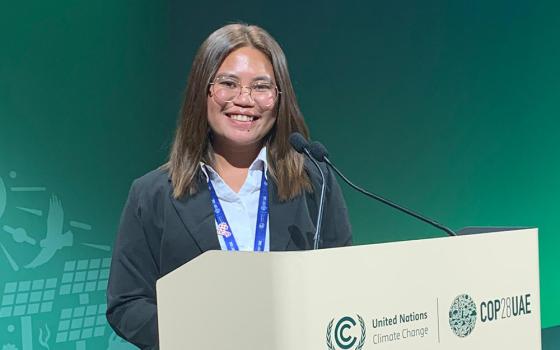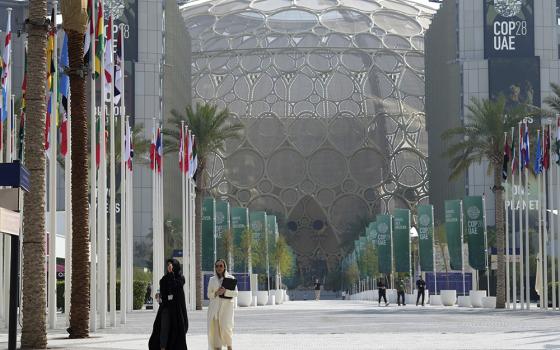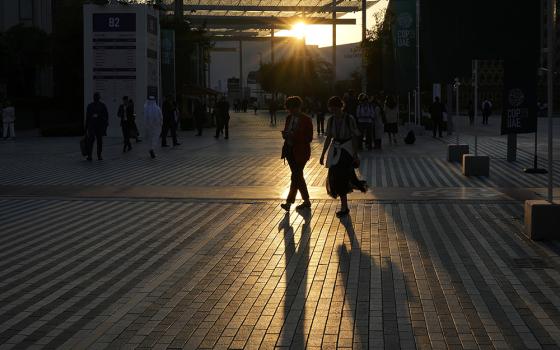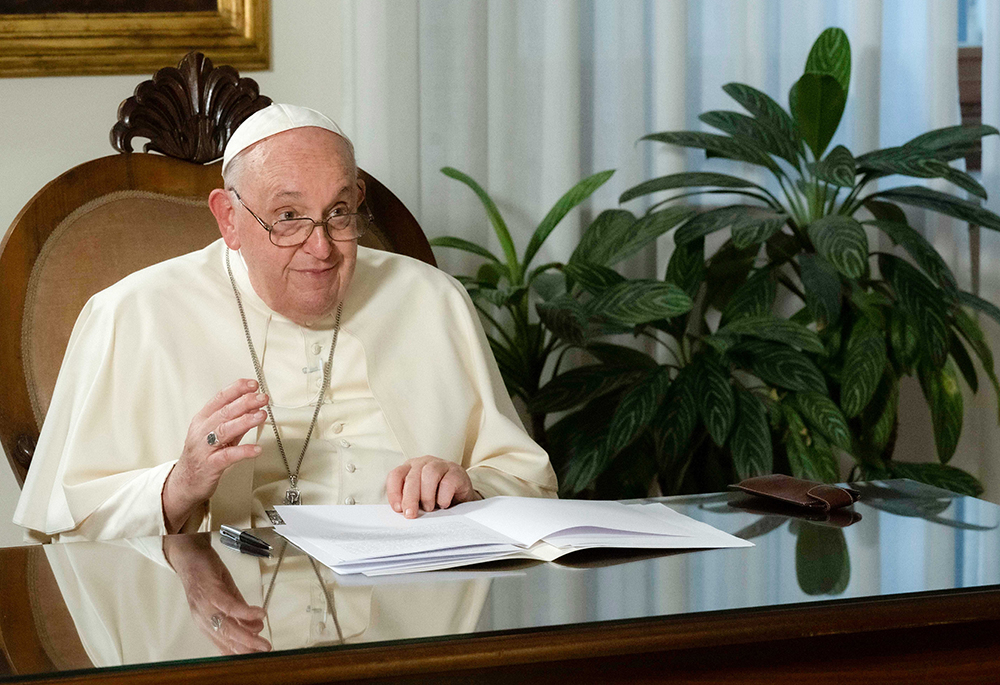
Pope Francis smiles after delivering his speech by video from the Vatican to religious leaders attending the inauguration of the Faith Pavilion at the U.N. climate change conference Dec. 3 in Dubai, United Arab Emirates. Pope Francis canceled his trip to Dubai because of a bronchial infection. (CNS/Vatican Media)
The first-ever Faith Pavilion at a United Nations climate change conference was inaugurated Dec. 3 in Dubai, with video messages from Pope Francis and Egypt's grand imam of Al-Azhar, who both called the world to work simultaneously for peace and preserving a livable climate.
In brief prerecorded remarks, Francis characterized peace and climate change as the most important issues facing the global community today.
The Faith Pavilion at COP28 is the result of a collaboration among host nation United Arab Emirates, the U.N. Environment Programme, the Muslim Council of Elders and a coalition of other faith-based partners around the world. Throughout the two-week summit, the Faith Pavilion will host 65 events featuring speakers from 54 countries. One of its goals is to elevate the voice of religious leaders within the climate negotiations space and to serve as a venue for country delegates to encounter faith-based organizations.
Among those attending the inaugural event on Day 4 of the climate conference were COP28 president Sultan al-Jaber, Vatican secretary of state Cardinal Pietro Parolin, Cardinal Miguel Ángel Ayuso, head of the Pontifical Council for Interreligious Dialogue, Mohamed Abdelsalam, secretary-general of the Muslim Council of Elders, and Miguel Ángel Moratinos, high representative for the U.N. Alliance of Civilizations.
Francis, as well as Grand Imam of Al-Azhar Ahmed al-Tayeb, a top cleric in Sunni Islam, had planned to attend the pavilion's opening at COP28 in person. But the pope had to call off his three-day trip days before the climate summit began when he fell ill with acute bronchitis.
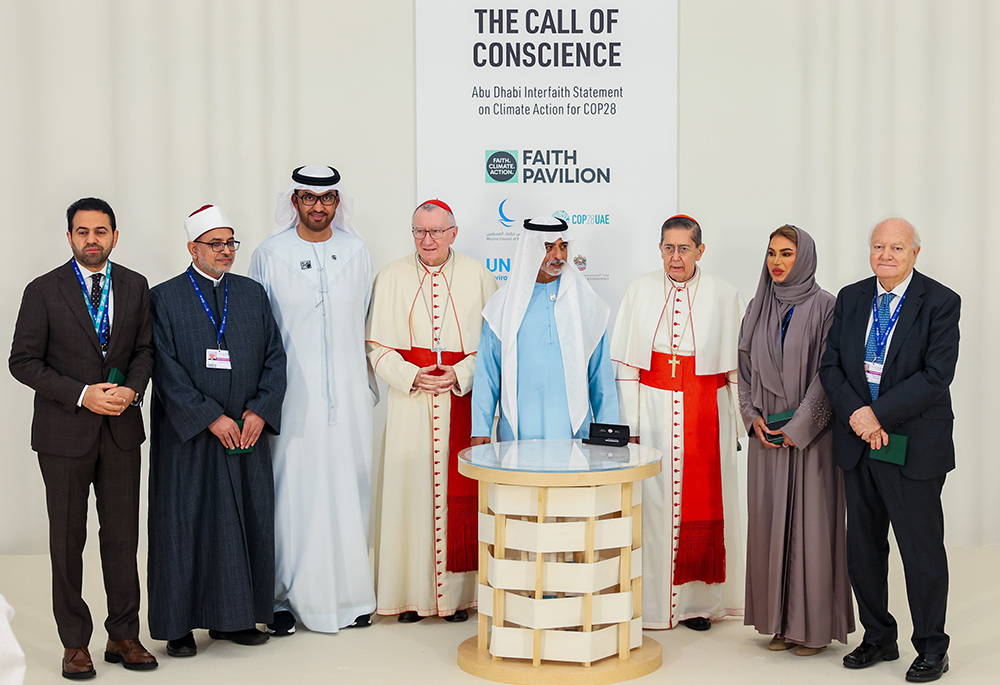
Cardinal Pietro Parolin, Vatican secretary of state, poses next to Sultan Ahmed al-Jaber, the president-designate of COP28, left, Sheikh Nahyan bin Mubarak Al Nahyan, the UAE Minister of Tolerance and Coexistence, center, and Cardinal Miguel Ángel Ayuso, prefect of the Dicastery for Interreligious Dialogue, and other representatives at the Faith Pavilion inauguration during COP28, Dec. 3 in Dubai, UAE. (CNS/Courtesy of U.N. Climate Change COP28/Christopher Pike)
In his message, Francis spoke softly and thanked those behind the Faith Pavilion's creation, saying it "testifies to the willingness to work together."
"At the present time the world needs alliances that are not against someone, but in favor of everyone," he said. "It is important that religions, without falling into the trap of syncretism, set a good example by working together: not for their own interests or those of one party, but for the interests of our world. Among these, the most important nowadays are peace and the climate."
Similarly, al-Tayeb, addressing the war between Israel and Hamas, stated "I implore the world: It is time to halt these atrocious, criminal wars."
"I am convinced that if they persist in this manner, God forbid, we will be left with neither a viable environment nor a livable climate for our children or future generations," he said.
After the recorded messages, a video played showing both religious leaders signing onto an interfaith statement addressed to COP28, which demanded that nations collectively take "transformative action" to hold average temperature rise to 1.5 degrees Celsius — a key goal of the 2015 Paris Agreement — and outlined 13 calls to action, including a rapid and just transition away from fossil fuels to clean energy sources. Since the late 1800s, the planet has heated 1.1 to 1.2 C, and global emissions need to be reduced nearly in half by 2030 to keep the 1.5 C warming limit within reach.
Al-Tayeb called climate change "one of the most serious challenges facing humanity today" and described COP28 as "a precious opportunity to enhance the efforts of protecting our common environment from imminent destruction, which is looming larger year after year."
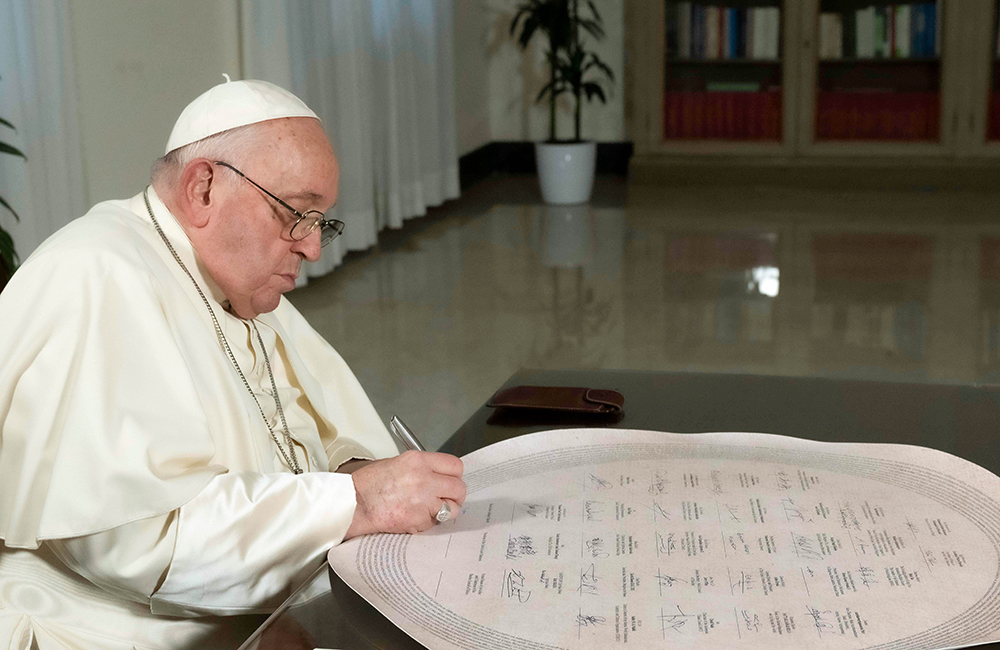
Pope Francis signs the Interfaith Statement on Climate Change in his Vatican residence Dec. 3. (CNS/Vatican Media)
The establishment of the Faith Pavilion at COP28 is the latest effort by the world's religions not only to speak in a unified voice on the protection of the planet, its people and ecosystems, but also to have a greater role within U.N. proceedings. Ahead of COP26, the pope hosted 40-plus faith leaders who signed a then-unprecedented interfaith letter calling for more urgent and ambitious responses to climate change. And last year in Montreal, the COP15 U.N. summit on biodiversity hosted its first Faith Pavilion.
Following the inaugural event, 30 religious leaders issued a statement from the Faith Pavilion that called on the nearly 200 countries at COP28 to adopt the Fossil Fuel Non-Proliferation Treaty to halt all new fossil fuel projects and outline a just and equitable path to fully abandon coal, oil and gas for renewable sources.
The fate of fossil fuels is at the center of debates at COP28. In a joint announcement, 106 countries, including the 27 nations in the European Union, have endorsed a global phaseout of unabated fossil fuels, which refers to emissions that cannot be captured and stored. The U.S. has also indicated its support.
The Faith Pavilion statement also pressed negotiators to fully fund the Green Climate Fund, which was meant to provide $100 billion annually to developing countries by 2020, and to extend and diversify funding for the newly established loss and damage fund. Finally, they advocated that "forceful accountability measures" be established to hold nations to their commitments and to account for inaction or delays.
Advertisement
“Faith leaders are united with climate scientists and activists to say: now is not the time to deny the science," Rabbi Yonatan Neril, founder of the Interfaith Center for Sustainable Development, said in an accompanying statement.
In a longer message during the Dec. 3 event, read by Parolin as was the case a day earlier at the world leaders' segment of the climate conference, Francis said the Faith Pavilion "shows that all authentic religious beliefs are a source of encounter and action."
He stressed the need for people to see past divisions and view one another as brothers and sisters who are finite creatures.
"For we are indeed mortal, we have our limits, and protecting life also entails opposing the rapacious illusion of omnipotence that is devastating our planet," the pope said. "That insatiable desire for power wells up whenever we consider ourselves lords of the world, whenever we live as though God did not exist and, as a result, end up prey to passing things. Then, instead of mastering technology, we let technology master us.
"That is why the problem of climate change is also a religious problem: its roots lie in the creature's presumption of self-sufficiency," Francis said in the remarks read by Parolin.
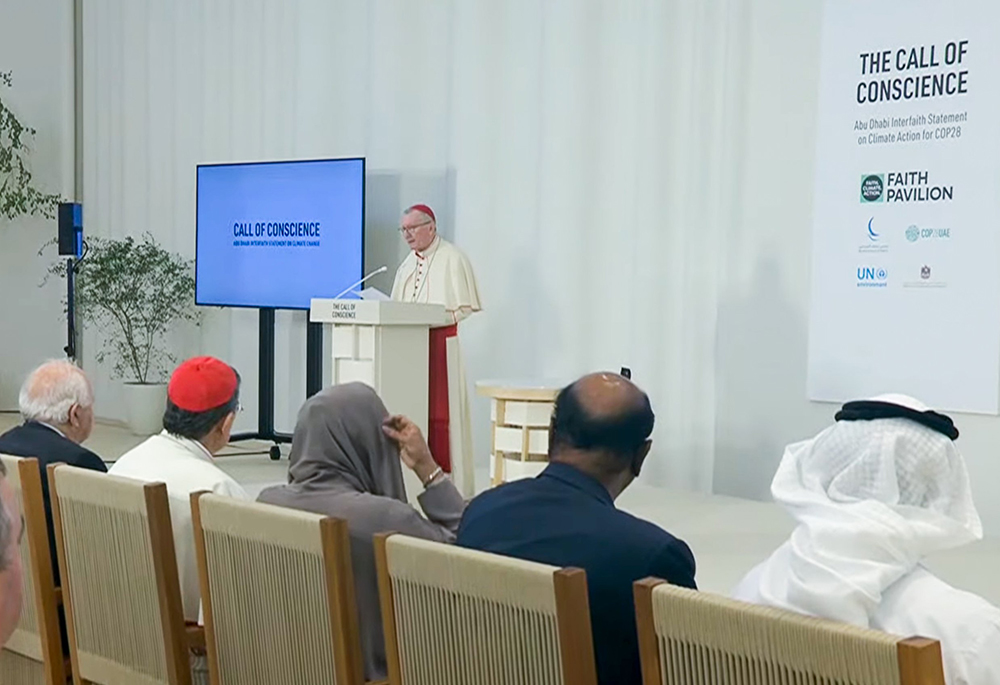
Cardinal Pietro Parolin, Vatican secretary of state, is seen in this screen grab reading Pope Francis' speech for the inauguration of the Faith Pavilion at COP28, the U.N. climate change conference, Dec. 3 in Dubai, United Arab Emirates. (CNS/screen grab, YouTube/COP28 UAE Official)
The pope again stressed the need for urgent action for the sake of the environment. He said it is not enough to increase spending, but "we need to change our way of life and thus educate everyone to sober and fraternal lifestyles. This is an essential obligation for religions, which are called to teach contemplation, since creation is not only an ecosystem to preserve, but also a gift to embrace."
He continued, "A world poor in contemplation will be a world polluted in soul, a world that will continue to discard people and produce waste."
Along with ushering an ecological conversion, religions are also tasked with peacekeeping, Francis said.
"Before our very eyes, we can see how wars and conflicts are harming the environment and dividing nations, hindering a common commitment to addressing shared problems like the protection of the planet," he said.
The pope's words emphasized the relationship between work for climate justice and for peace, said Josianne Gauthier, secretary general of CIDSE, a network of mostly European-based Catholic development agencies.
Gauthier attended the Faith Pavilion inauguration, watching a livestream outside of the area where the presentations took place. While "a bit small and formal," she told EarthBeat it is an important space and one she hopes is continued in future climate COPs.
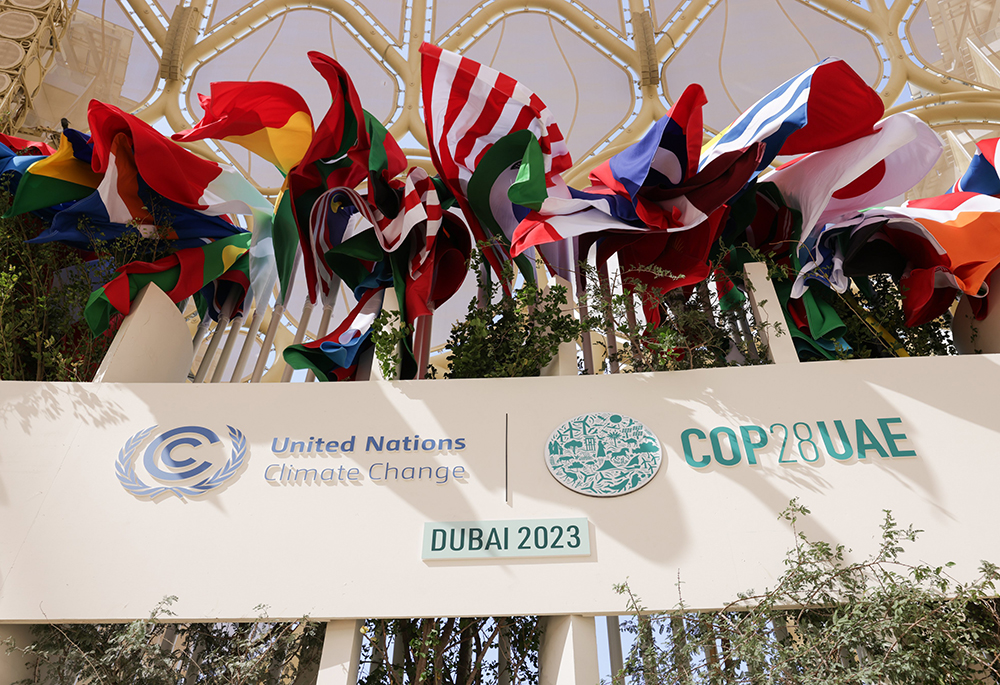
Flags can be see inside the dome during COP28, the U.N. climate change conference, at Expo City Dubai Nov. 30 in Dubai, United Arab Emirates. (CNS/Courtesy of U.N. Climate Change COP28/Christophe Viseux)
Jesuit Fr. Rigobert Minani, at COP28 representing the Ecclesial Network of the Congo Basin, added that he believed the Faith Pavilion has already helped to give faith-based organizations a greater presence at the summit. He told EarthBeat he believes it can also help religions learn from one another, and to assist country delegates in developing interconnected approaches to mitigation, adaptation and loss and damage from climate change.
Within the opening days of COP28, nations have reached a series of deals.
They finalized a loss and damage fund, and 15 nations and the European Union have so far pledged $655 million in initial financing, including $100 million from the UAE and $17.5 million from the U.S, which also pledged an additional $3 billion to the Green Climate Fund. The loss and damage fund aims to help countries that have already suffered destruction and both economic and noneconomic losses from climate-related impacts.
The U.S. announced a new rule to nearly wipe out emissions from methane — a greenhouse gas far more potent than carbon dioxide — and 50 oil companies pledged to mostly eliminate methane emissions from operations by 2030. Nearly 120 countries have committed to tripling renewable energy capacity by 2030, and in a separate deal, 20-plus countries announced plans to triple nuclear energy production by 2050.
Environmental groups offered mixed reactions to the pledges, noting that most of the deals announced so far are voluntary and do not require any reduction of the use of fossil fuels, whose burning releases heat-trapping greenhouse gases that are primarily driving climate change. Numerous Catholic and faith groups have joined calls for countries at COP28 to commit to a full phaseout of fossil fuels.
On Dec. 2, Colombia, a large oil-producing country, became the 10th nation to endorse a Fossil Fuel Non-Proliferation Treaty.




